Mar 11, 2021 | staff reporter NEW YORK — Whole-genome sequencing could serve as an alternative to cytogenetic analysis for acute myeloid leukemia or myelodysplastic syndromes, a new study has found.
Category: News
Finnish Cardiometabolic Study Uncovers Strong Effect of Structural Variants (Links to an external site)
Mar 23, 2021 | staff reporter NEW YORK – Using genetic data for thousands of individuals from the Finnish population, an international team has tracked down more than a dozen loci linked to cardiometabolic traits, including two previously unappreciated structural variant (SV) sites that appear to have particularly strong ties to specific traits.
Mitochondrial Phenotypes Distinguish Pathogenic MFN2 Mutations by Pooled Functional Genomics Screen (Links to an external site)
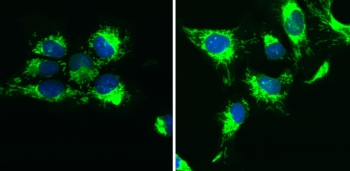
Alex L Yenkin, John C Bramley, Jason E Waligorski, Colin L Kremitzki, Mariel J Liebeskind, Xinyuan E Xu, Maria A Vakaki, Vinay Chandrasekaran, Robi David Mitra, Jeffrey D Milbrandt, William J Buchser MGI identified subtle mitochondrial phenotypes & physically captured individual cells with single point mutations.
Whole genome sequencing shows promise in routine treatment of blood cancers, Washington U. study says (Links to an external site)
Michele Munz ST. LOUIS — Washington University researchers are among the first to show that whole genome sequencing, which used to be time-consuming and expensive, can be used routinely in patient care.
Promising role for whole genome sequencing in guiding blood cancer treatment (Links to an external site)
Sequencing results returned in a few days; costs similar to conventional testing by Julia Evangelou Strait•March 10, 2021
Research Reveals How COVID-19 Can Kill Heart Muscle Cells, Interfere With Contraction (Links to an external site)
By WASHINGTON UNIVERSITY SCHOOL OF MEDICINE MARCH 2, 2021 Study reveals details of how coronavirus infects heart; models of tissue damage may help develop potential therapies.
Antibody-based COVID-19 treatments work best in concert with immune cells (Links to an external site)
Findings involving antibody effector functions could help improve design of next-generation COVID-19 antibody drugs
Glioblastoma Omics Study Highlights Informative Tumor Features, Immune Subtypes (Links to an external site)
By Staff Reporter NEW YORK – A team from Washington University, the Pacific Northwest National Laboratory, and elsewhere has identified immune subgroups in glioblastoma (GBM) that may ultimately help in developing more effective immunotherapy approaches against aggressive brain cancer.
U.S. rushes to fill void in viral sequencing as worrisome coronavirus variants spread (Links to an external site)
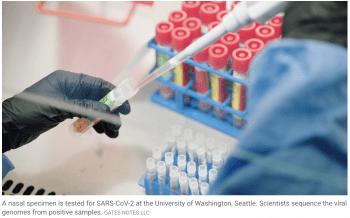
By Meredith Wadman Since May 2020, Jeffrey Milbrandt has had his systems fine-tuned to sequence 1000 coronavirus samples a week. The director of a major sequencing center at Washington University in St. Louis (WashU), Milbrandt knew months ago that the United States urgently needed to identify and track emerging variants of SARS-CoV-2, the pandemic coronavirus already […]
PercayAI and Saint Louis University Partner to Accelerate AI Adoption across Biomedical Sciences Research (Links to an external site)
Sequencing the future (Links to an external site)
Generous pledge from James and Elizabeth McDonnell accelerates the expansion of their namesake genome institute BY MARY LEE
Combating COVID-19 (Links to an external site)
Medical school labs pivot to fight a common enemy
Fluidigm Obtains CE Mark for Saliva-Based SARS-CoV-2 Assay (Links to an external site)
Fluidigm said on Thursday that it has received the CE-IVD mark for its Advanta Dx SARS-CoV-2 RT-PCR assay, an extraction-free saliva-based test to detect nucleic acid from the SARS-CoV-2 virus.
Washington University pumps millions into Cortex building, as another rises nearby (Links to an external site)

Washington University is investing millions of dollars in a decades-old building near Cortex, helping boost occupancy there as another 11-story research development rises nearby. The university last summer completed renovations to the McDonnell Genome Institute and Genome Technology Access Center, both at 4444 Forest Park Ave. And more work, including a genome engineering center and […]
Researchers to work with parents, teachers on COVID-19 testing communications (Links to an external site)

Researchers at the Brown School at Washington University in St. Louis are conducting discussion groups with parents and staff in the Special School District of St. Louis County (SSD) to develop communication tools surrounding COVID-19 testing and vaccination.
Photos: Washington U. School of Med. deploys COVID saliva testing (Links to an external site)
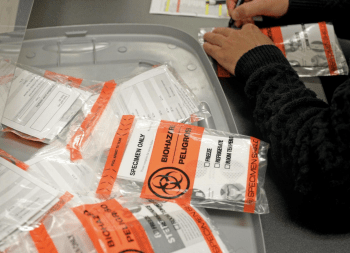
Washington University School of Medicine, using a $5 million grant from the National Institutes of Health, has begun administering the COVID-19 saliva test it developed in the Special School District of St. Louis County in search of asymptomatic carriers among teachers initially. The test, which is reportedly 99% accurate, is distributed weekly on a voluntary […]
Washington University Laboratory Develops COVID-19 Saliva Test for Screening on a Massive Scale (Links to an external site)
By Kathleen Berger, Executive Producer for Science & Technology
Next-Generation Sequencing: Tracking the Spread and Evolution of SARS-CoV-2 (Links to an external site)
Podcast: The making of a fast, accurate saliva test for COVID-19 (Links to an external site)
A new episode of our podcast, “Show Me the Science,” has been posted. At present, these podcast episodes are highlighting research and patient care on the Washington University Medical Campus as our scientists and clinicians confront the COVID-19 pandemic.
Washington University Spit Test Approved by FDA for Virus (Links to an external site)
A Washington University spit test for the coronavirus has been approved by the Food and Drug Administration.
Interview on Washington University’s new Saliva COVID Test (Links to an external site)

The Director of GTAC@MGI discusses the new test and how it will help the community.
WUSTL-led Team Compiles Human Structural Variant Resource (Links to an external site)
“A team led by Washington University in St. Louis researchers has profiled rare and ultra-rare structural variants in nearly 18,000 high-coverage whole-genome sequences in an effort to fill in remaining gaps in the understanding of the larger variants that impact protein-coding and non-coding portions of the genome.”
$5 million supports research into neglected tropical diseases (Links to an external site)
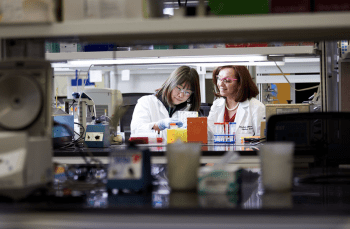
“Led by Makedonka Mitreva, PhD, a professor of medicine and of genetics, both projects involve large-scale genome sequencing of the parasites to develop genetic tools to help monitor the infections’ spread and track resistance these parasites already have developed against drugs intended to eradicate them. “ https://medicine.wustl.edu/news/5-million-supports-research-into-neglected-tropical-diseases/
School of Medicine physicians, researchers tackle coronavirus (Links to an external site)
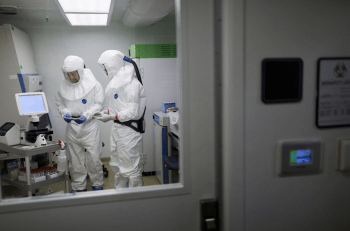
Clinical teams ready; research for vaccines, drugs underway “geneticist Ting Wang, PhD, the Sanford and Karen Loewentheil Distinguished Professor of Medicine, and members of his lab built a genome browser to help researchers study the genetics of the COVID-19 virus and compare different strains.”
Personal toll (Links to an external site)
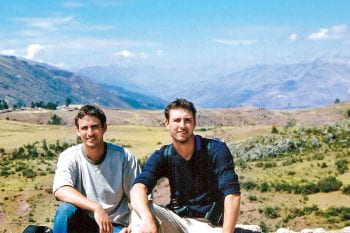
Mother’s death sets twin scientists on journey to find precision cancer therapies
Immune responses to tuberculosis mapped across 3 species (Links to an external site)
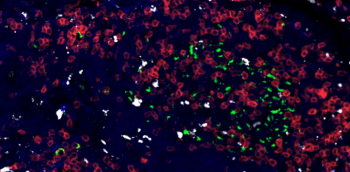
A detailed genetic road map will guide research into TB treatments, vaccines. This work and article features co-senior author Makedonka Mitreva, PhD, a professor of medicine and of genetics at Washington University and a researcher at the university’s McDonnell Genome Institute.
$3.7M Grant Supports Precision Medicine, Genomics Database (Links to an external site)

Washington University has received a grant from NIH that will support an open-source genomic database to advance precision medicine for cancer.
Kingdom Capital Collaborates with Washington University School of Medicine to Launch Augmented Intelligence Company PercayAI (Links to an external site)
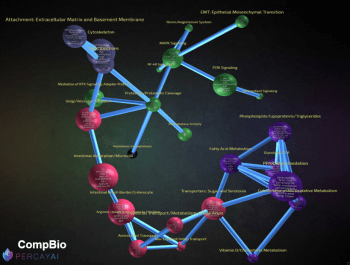
– PercayAI, launched by Kingdom Capital, represents the investment firm’s commitment to cultivating new technologies that can help accelerate drug discovery and improve patient outcomes – Washington University School of Medicine in St. Louis will continue to develop technology that will be commercialized through PercayAI as part of an ongoing collaboration with Kingdom Capital
NIH funds centers to improve, diversify reference human genome (Links to an external site)

School of Medicine to help lead ambitious Human Pangenome Reference Sequencing Project
NHGRI funds centers for advancing the reference sequence of the human genome (Links to an external site)
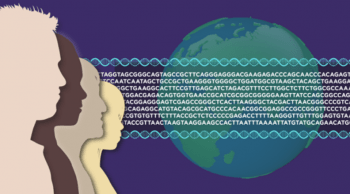
New grants totaling approximately $29.5 million will enable scientists to generate and maintain the most comprehensive reference sequence of the human genome. The awards, made over five years pending the availability of funds, are managed by the National Human Genome Research Institute (NHGRI), part of the National Institutes of Health.
When Size Matters: Using SMRT Sequencing to Help Patients With Repeat Expansion Disorders (Links to an external site)
Washington University-Led Team Wins Five-Year, $68M NIH Grant for Longevity Sequencing Study (Links to an external site)
$15 million supports quest for personalized leukemia therapies (Links to an external site)
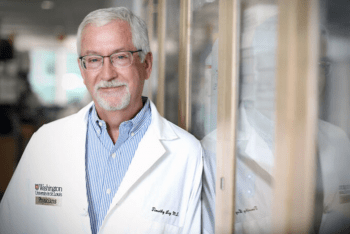
Grant bolsters leadership in developing new approaches to understanding, treating leukemia
Finnish people’s unique genetic makeup offers clues to disease (Links to an external site)

Study of Finns, with their similar DNA, gives new hints to cardiovascular, metabolic disease risk
Academy of Science-St. Louis honors faculty (Links to an external site)

Dutcher received a 2019 George Engelmann Interdisciplinary Award, which recognizes outstanding achievement in science, engineering or technology that results from collaboration among two or more individuals across disciplinary or institutional boundaries.
Five inducted into Bouchet Graduate Honor Society (Links to an external site)
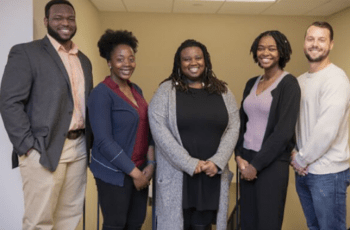
Five PhD candidates at Washington University in St. Louis were inducted into the Edward A. Bouchet Graduate Honor Society at the annual Bouchet Conference on Diversity and Graduate Education April 5-6 at Yale University.
Colonna, Ley elected to National Academy of Sciences (Links to an external site)

School of Medicine scientists among 100 new members nationwide
Centene and Washington University collaborate to advance personalized medicine research (Links to an external site)
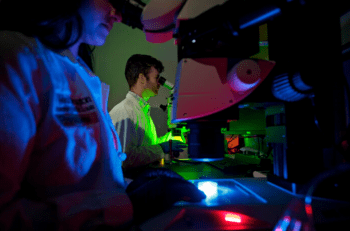
School of Medicine expands mission of McDonnell Genome Institute (Links to an external site)

Will apply its powerhouse DNA sequencing to precision medicine
Medication for severe acne alters skin microbiome (Links to an external site)
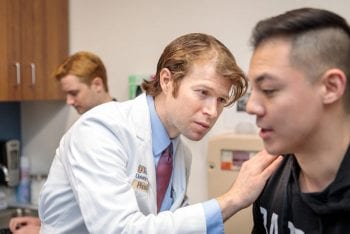
Study raises potential for development of microbiome-based acne treatments
300M letters of DNA are missing from the Human Genome Project (Links to an external site)

The world’s most famous genetic tool has a major diversity problem.
Quantum leap in parasite worm treatment research
Parasitic roundworms & flatworms (helminths) cause some of the most common yet neglected tropical infectious diseases affecting more than 1B people worldwide.
Relapsed leukemia flies under immune system’s radar (Links to an external site)
MGI researchers have shown one way relapsed leukemia cells evade the immune system and identified a possible way to reverse the cancer’s evasive maneuvers.
Genes linked to Alzheimer’s contribute to damage in different ways (Links to an external site)

Multiple genes are implicated in Alzheimer’s disease. Some are linked to early-onset Alzheimer’s, a condition that develops in one’s 30s, 40s and 50s, while others are associated with the more common late-onset form of the disease.
Genetic testing helps predict disease recurrence in myelodysplastic syndrome (Links to an external site)
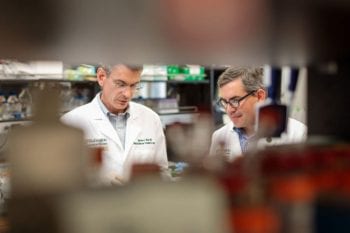
A DNA-based analysis of blood cells soon after a stem cell transplant can predict likelihood of disease recurrence in patients with myelodysplastic syndrome (MDS), a group of cancerous disorders characterized by dysfunctional blood cells, according to new research at WU and MGI. Such a practice could help doctors identify patients at high risk of disease recurrence early after a transplant and help guide treatment decisions. The study is published Sept. 13 in The New England Journal of Medicine.
10X Genomics Hosts 2018 Symposium at WashU
10X Genomics had its first single cell user group meeting at Washington University on Tuesday August 28, 2018. The symposium took place at Eric P. Newman Center from 9-4 and was filled with speakers, software demonstrations, discussions, and networking. Ranging from various disciplines and departments, speakers from Washington University included Dr. Benjamin Humphreys (Renal), Dr. Allegra Petti […]
MGI Cohosts Upcoming 2018 PacBio Meeting September 19-20
The McDonnell Genome Institute is proudly collaborating with PacBio Sequencing to host its first user group meeting at Washington University on Wednesday September 19-20, 2018. The event will take place at the Eric P. Newman Center located on Washington University Medical School Campus. The event will offer the opportunity to explore new scientific content through […]
Analysis of prostate tumors reveals clues to aggressiveness (Links to an external site)
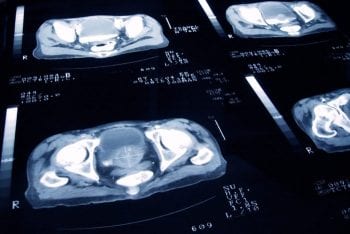
Using genetic sequencing, scientists have revealed the complete DNA makeup of more than 100 aggressive prostate tumors, pinpointing important genetic errors these deadly tumors have in common. The study lays the foundation for finding new ways to treat prostate cancer, particularly for the most aggressive forms of the disease.
Funded Pilot Project
The McDonnell Genome Institute at (MGI) has awarded 9 pilot project grants to support novel collaborations with WU investigators. A committee of 5 faculty members reviewed the 48 submissions from a variety of departments and awarded nine grants. Luigi Adamo, Kory Lavine, Douglass Mann – Cardiology Characterization of myocardial B cells heterogeneity and clonal expansion […]
Major breakthrough in cancer care as gene map paves way for new treatments (Links to an external site)
Atlas of 11,000 patient’s tumours across 33 different cancer types will improve treatment and new research.